-
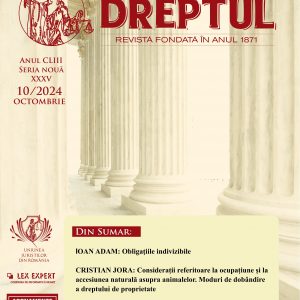
-
 n cazul în care contractul de transport a fost încheiat prin intermediul unei case de expediții, în lipsa unei prevederi contractuale exprese sau a unei prevederi legale, nu se poate solicita de la respectivul intermediar repararea prejudiciului cauzat transportatorului ca urmare a avariilor determinate de marfa transportată și care nu a fost ambalată în mod corespunzător. În plus, dacă transportatorul nu a făcut rezerve cu privire la marfa primită, conform art. 9 din Convenția referitoare la contractul de transport internațional de mărfuri pe șosele (CMR) există prezumția că mărfurile transportate au fost în bună stare. (Curtea de Apel Constanța, Secția a II-a civilă, Decizia nr. 50 din 10 februarie 2020, www.rolii.ro)
n cazul în care contractul de transport a fost încheiat prin intermediul unei case de expediții, în lipsa unei prevederi contractuale exprese sau a unei prevederi legale, nu se poate solicita de la respectivul intermediar repararea prejudiciului cauzat transportatorului ca urmare a avariilor determinate de marfa transportată și care nu a fost ambalată în mod corespunzător. În plus, dacă transportatorul nu a făcut rezerve cu privire la marfa primită, conform art. 9 din Convenția referitoare la contractul de transport internațional de mărfuri pe șosele (CMR) există prezumția că mărfurile transportate au fost în bună stare. (Curtea de Apel Constanța, Secția a II-a civilă, Decizia nr. 50 din 10 februarie 2020, www.rolii.ro) -

-

-

-
 Reclamanții nu pot solicita în temeiul răspunderii civile delictuale daune de la un terț pentru degradări aduse imobilului în condițiile în care au cumpărat imobilul în anul 2018 prin contract de vânzare-cumpărare în formă autentică și puteau invoca răspunderea civilă contractuală pentru vicii sau pentru evicțiune. Acțiunea în răspundere civilă delictuală este o acțiune personală care aparține proprietarului imobilului de la momentul producerii faptei ilicite și potrivit art. 1707 alin. (4) C.civ. reclamanții nu au dreptul să se plângă privitor la starea construcțiilor dobândite, deoarece lucrul dobândit are exact calitățile pe care le așteptau de la el. În categoria drepturilor accesorii se pot include drepturi reale (opozabile erga omnes), cum este, spre exemplu, dreptul de servitute, care se transmite automat odată cu înstrăinarea fondului (dominant sau aservit). În ceea ce privește eventualele drepturi personale consimțite de vânzător, ca regulă generală, acestea nu se transmit la cumpărător, care este un având cauză cu titlu particular. (Curtea de Apel Craiova, Secția I civilă, Decizia nr. 223 din 16 martie 2021,www.portaljust.ro)
Reclamanții nu pot solicita în temeiul răspunderii civile delictuale daune de la un terț pentru degradări aduse imobilului în condițiile în care au cumpărat imobilul în anul 2018 prin contract de vânzare-cumpărare în formă autentică și puteau invoca răspunderea civilă contractuală pentru vicii sau pentru evicțiune. Acțiunea în răspundere civilă delictuală este o acțiune personală care aparține proprietarului imobilului de la momentul producerii faptei ilicite și potrivit art. 1707 alin. (4) C.civ. reclamanții nu au dreptul să se plângă privitor la starea construcțiilor dobândite, deoarece lucrul dobândit are exact calitățile pe care le așteptau de la el. În categoria drepturilor accesorii se pot include drepturi reale (opozabile erga omnes), cum este, spre exemplu, dreptul de servitute, care se transmite automat odată cu înstrăinarea fondului (dominant sau aservit). În ceea ce privește eventualele drepturi personale consimțite de vânzător, ca regulă generală, acestea nu se transmit la cumpărător, care este un având cauză cu titlu particular. (Curtea de Apel Craiova, Secția I civilă, Decizia nr. 223 din 16 martie 2021,www.portaljust.ro) -
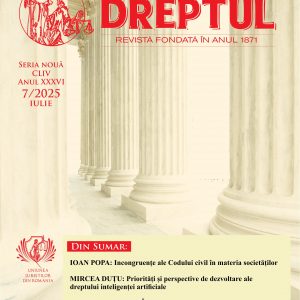
-
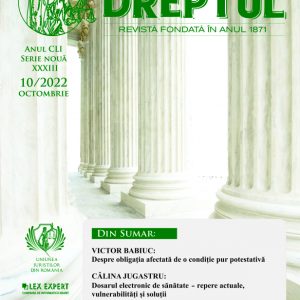
-
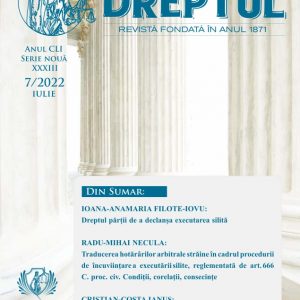
-
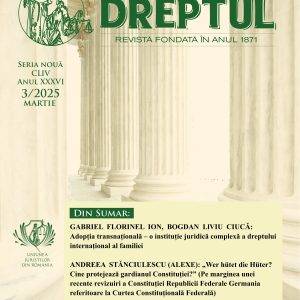
-
 The study of the contract of audiovisual adaptation has been imposed for multiple reasons. Firstly, as no contract of transfer agreement of the author’s patrimonial rights, which includes also the contract of audiovisual adaptation, does not have its own regulation in the Civil Code (Law no. 287/2009). Consequently, the current article deals also with the problem of the incidence of the norms of common law on the analyzed contract. Secondly, the research was also determined by the fact that in the Law no. 8/1996 regarding the author’s rights and the associated rights this type of contract was allocated a laconic regulation, i.e. only in a single article of law. Thirdly, the discussion of this topic was necessary as the norms dedicated to the contract of audiovisual adaptation included in the special Law are not clearly, fluently and comprehensively enough formulated, presenting quite a few faults lacunae and even imprecision, which the author highlighted, sometimes under the form of de lege ferenda proposals.
The study of the contract of audiovisual adaptation has been imposed for multiple reasons. Firstly, as no contract of transfer agreement of the author’s patrimonial rights, which includes also the contract of audiovisual adaptation, does not have its own regulation in the Civil Code (Law no. 287/2009). Consequently, the current article deals also with the problem of the incidence of the norms of common law on the analyzed contract. Secondly, the research was also determined by the fact that in the Law no. 8/1996 regarding the author’s rights and the associated rights this type of contract was allocated a laconic regulation, i.e. only in a single article of law. Thirdly, the discussion of this topic was necessary as the norms dedicated to the contract of audiovisual adaptation included in the special Law are not clearly, fluently and comprehensively enough formulated, presenting quite a few faults lacunae and even imprecision, which the author highlighted, sometimes under the form of de lege ferenda proposals. -

